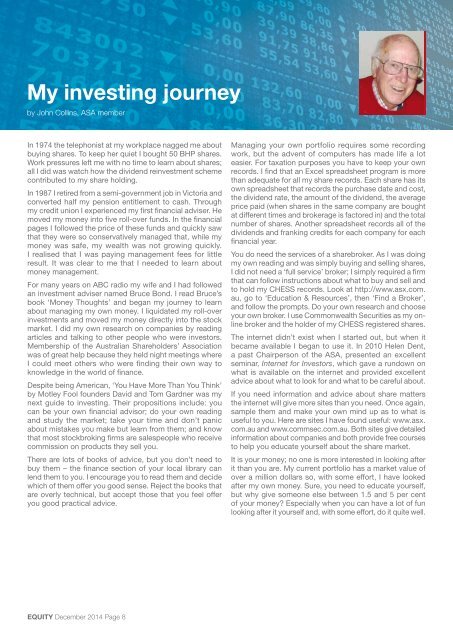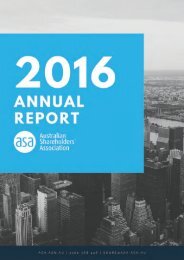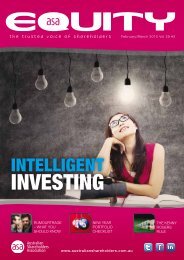eq-2014-12
eq-2014-12
eq-2014-12
Create successful ePaper yourself
Turn your PDF publications into a flip-book with our unique Google optimized e-Paper software.
My investing journey<br />
by John Collins, ASA member<br />
In 1974 the telephonist at my workplace nagged me about<br />
buying shares. To keep her quiet I bought 50 BHP shares.<br />
Work pressures left me with no time to learn about shares;<br />
all I did was watch how the dividend reinvestment scheme<br />
contributed to my share holding.<br />
In 1987 I retired from a semi-government job in Victoria and<br />
converted half my pension entitlement to cash. Through<br />
my credit union I experienced my first financial adviser. He<br />
moved my money into five roll-over funds. In the financial<br />
pages I followed the price of these funds and quickly saw<br />
that they were so conservatively managed that, while my<br />
money was safe, my wealth was not growing quickly.<br />
I realised that I was paying management fees for little<br />
result. It was clear to me that I needed to learn about<br />
money management.<br />
For many years on ABC radio my wife and I had followed<br />
an investment adviser named Bruce Bond. I read Bruce’s<br />
book ‘Money Thoughts’ and began my journey to learn<br />
about managing my own money. I liquidated my roll-over<br />
investments and moved my money directly into the stock<br />
market. I did my own research on companies by reading<br />
articles and talking to other people who were investors.<br />
Membership of the Australian Shareholders’ Association<br />
was of great help because they held night meetings where<br />
I could meet others who were finding their own way to<br />
knowledge in the world of finance.<br />
Despite being American, ‘You Have More Than You Think’<br />
by Motley Fool founders David and Tom Gardner was my<br />
next guide to investing. Their propositions include: you<br />
can be your own financial advisor; do your own reading<br />
and study the market; take your time and don’t panic<br />
about mistakes you make but learn from them; and know<br />
that most stockbroking firms are salespeople who receive<br />
commission on products they sell you.<br />
There are lots of books of advice, but you don’t need to<br />
buy them – the finance section of your local library can<br />
lend them to you. I encourage you to read them and decide<br />
which of them offer you good sense. Reject the books that<br />
are overly technical, but accept those that you feel offer<br />
you good practical advice.<br />
Managing your own portfolio r<strong>eq</strong>uires some recording<br />
work, but the advent of computers has made life a lot<br />
easier. For taxation purposes you have to keep your own<br />
records. I find that an Excel spreadsheet program is more<br />
than ad<strong>eq</strong>uate for all my share records. Each share has its<br />
own spreadsheet that records the purchase date and cost,<br />
the dividend rate, the amount of the dividend, the average<br />
price paid (when shares in the same company are bought<br />
at different times and brokerage is factored in) and the total<br />
number of shares. Another spreadsheet records all of the<br />
dividends and franking credits for each company for each<br />
financial year.<br />
You do need the services of a sharebroker. As I was doing<br />
my own reading and was simply buying and selling shares,<br />
I did not need a ‘full service’ broker; I simply r<strong>eq</strong>uired a firm<br />
that can follow instructions about what to buy and sell and<br />
to hold my CHESS records. Look at http://www.asx.com.<br />
au, go to ‘Education & Resources’, then ‘Find a Broker’,<br />
and follow the prompts. Do your own research and choose<br />
your own broker. I use Commonwealth Securities as my online<br />
broker and the holder of my CHESS registered shares.<br />
The internet didn’t exist when I started out, but when it<br />
became available I began to use it. In 2010 Helen Dent,<br />
a past Chairperson of the ASA, presented an excellent<br />
seminar, Internet for Investors, which gave a rundown on<br />
what is available on the internet and provided excellent<br />
advice about what to look for and what to be careful about.<br />
If you need information and advice about share matters<br />
the internet will give more sites than you need. Once again,<br />
sample them and make your own mind up as to what is<br />
useful to you. Here are sites I have found useful: www.asx.<br />
com.au and www.commsec.com.au. Both sites give detailed<br />
information about companies and both provide free courses<br />
to help you educate yourself about the share market.<br />
It is your money; no one is more interested in looking after<br />
it than you are. My current portfolio has a market value of<br />
over a million dollars so, with some effort, I have looked<br />
after my own money. Sure, you need to educate yourself,<br />
but why give someone else between 1.5 and 5 per cent<br />
of your money Especially when you can have a lot of fun<br />
looking after it yourself and, with some effort, do it quite well.<br />
EQUITY December <strong>2014</strong> Page 8




